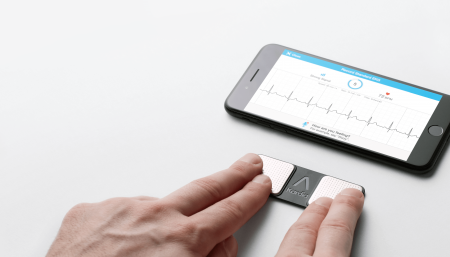September 12, 2017 – AliveCor has created Kardia, a pulse-monitoring pad that wirelessly connects to an app running on a smartphone, or tablet, and allows users to self-administer an EKG anywhere. First conceived in 2013, Kardia, according to the latest study from the Cleveland Clinic, produces accuracy equal to any EKG performed in a physician’s office. A 30-second EKG can diagnose a patient with atrial fibrillation (AFib) with great accuracy, even those previously undiagnosed. A large study done at the Chinese University of Hong Kong included 12,000 participants. Another study at Hong Kong’s Princess Margaret Hospital involving over 10,000 participants yielded similar results. It is not surprising that the company describes its product as the most clinically validated EKG solution on the market.
Two large studies done in Hong Kong, one at the Chinese University of Hong Kong including 12,000 participants, and another study at Hong Kong’s Princess Margaret Hospital involving over 10,000 participants, yielded accurate detections of AFib and even detected the condition in those previously undiagnosed. The company is more than ecstatic about the results and not surprisingly describes Kardia as the most clinically validated EKG solution on the market.
How does it work?
There are two components to Kardia: the app running on an Android or Apple smartphone, and a single-lead rhythm strip that can slip into a pocket or wallet. When a user detects something odd in their heart rhythm they can sit down, take out the strip, open the app, and place two fingers from each hand on the strip keeping them there for 30 seconds.
The mobile app wirelessly picks up the users heart rhythm with the single-lead rhythm strip working like the leads found in standard EKG machines. The information detected is transmitted to the app containing an algorithm that presents 98% accuracy in reading heart rhythm and 97% effectiveness in detecting AFib. The results compare favourably to wearing a Holter monitor or using a portable device for monitoring and recording heart rhythm over several days.
Kardia gives its users the ability to monitor their hearts any time they think something could be wrong. The app keeps a personal heart profile which can be shared with doctors.
The company’s literature contains two user quotes that are worth sharing. States one, “Several times when I was in atrial fibrillation, I was able to talk with my doctor by phone and adjust medication and avoid a trip to the ER.” And another, “I went years without a diagnosis. With Kardia I had the ability to take an EKG whenever I felt anything unusual. After only two readings I had a conclusive diagnosis….Now I use it to track my AFib events and discuss treatment options with my doctor.”
And at $99 U.S., anyone who has experienced or been diagnosed with AFib may want to consider making the investment. You can download the app from the App Store and Google Play. It runs on iPhone models from the 4s to the 7 Plus, and on Samsung Galaxy Note and S3, 4, 5, 6 and 7 models plus the LG Nexus 5, HTC One M7, Jitterbug Touch 3, and Google Pixel and Pixel XL. AliveCor notes that if you do not have one of these devices it cannot guarantee compatibility.









